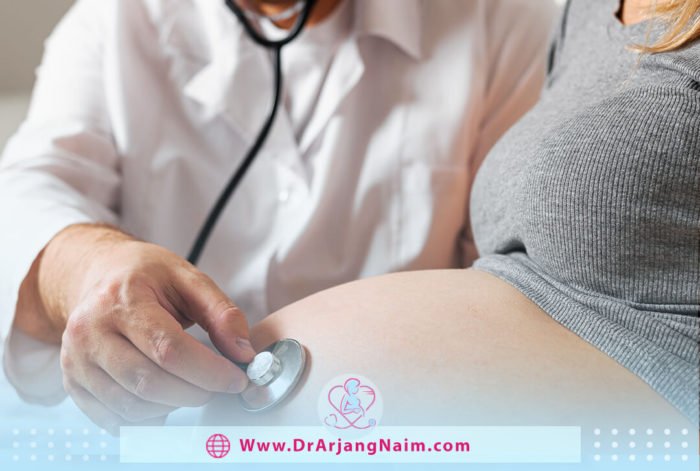Pregnancy care is the best thing you can do for yourself and your baby during pregnancy. Prenatal care includes a set of procedures in which periodic examinations, tests, and paraclinical examinations are performed, and the mother and those around her are trained.
The purpose of prenatal care is to diagnose the symptoms of the danger and to refer them for treatment in time, and finally to prepare the mother for childbirth, which prevents the occurrence of pregnancy and childbirth complications that leads to a reduction in mother and baby mortality.
What happens during prenatal care?
Blood and urine tests may be given at the first prenatal care session and may be repeated in subsequent sessions. A urine test is needed to check for bacteria, high blood sugar, diabetes, and high protein levels, which can indicate preeclampsia. Physical examinations are also performed.
Physical examinations generally consist of:
- Doppler fetal heart rate monitoring
- Measuring the abdomen to check the baby’s growth
- Checking blood pressure
- Checking mother weight
- Pelvic exam
When is an ultrasound done?

One of the prenatal care is ultrasound. Ultrasound is usually done four times during pregnancy. Week 7 for pregnancy confirmation; weeks 13 to 14 for pregnancy for possible evaluation of Down syndrome; weeks 18 to 20 for pregnancy; and the 34th weeks for size assessment and placental status determination. Ultrasound is relatively safe. Ultrasound is also used in the following cases:
- Diagnose pregnancy
- Check for Multiple Pregnancy
- Check for fetal malformation (e.g., spina bifida, cleft palate, clubfoot, clenched fists)
- Assessment of the development of fetal body parts (e.g., brain, heart, liver, stomach, skull, and other bones)
- Determine the due date (based on relative developmental progress and measurements)
- Check the umbilical cord for possible problems and amniotic fluid
How often do you need prenatal visits?
Most pregnant women should be screened as follows:
- Weeks 4 to 28 of pregnancy – once every four weeks (once a month)
- Weeks 28 to 36 of pregnancy – once every two weeks (twice a month)
- Week 36 to 41 of pregnancy – once a week
You may need to see your doctor more often if you have complications during pregnancy.
Postpartum Care
Although most attention to prenatal care is focused on the nine months of pregnancy, postpartum care is also important. The postpartum lasts six to eight weeks, starting right after the baby is born. During this period, the mother undergoes many physical and emotional changes while learning to care for her baby. Postpartum care includes nutrition, proper rest, and vaginal care.
Adequate rest is very important for the mother, so when the baby is asleep, the mother should also sleep at night and place the baby’s cradle near the mother to be more comfortable feeding the baby. Proper nutrition in the postpartum period is very important for the body due to changes during pregnancy and childbirth. Therefore, follow a healthy and nutritious diet after delivery.
Vaginal care is an essential part of postpartum care. See a doctor about six weeks after giving birth for the necessary examinations. Also, avoid having sex for four to six weeks after giving birth so your vagina can heal.
What does a high-risk pregnancy mean?
During prenatal care, the obstetrician becomes aware of the possibility of a high-risk pregnancy. Pregnancy is considered dangerous when the doctor determines the possibility of complications affecting the mother, child, or both. In such cases, the mother and fetus must be supervised by medical care to be fully controlled in case of any problems.
These people need to see a doctor more often and may need more tests and ultrasounds during pregnancy to monitor the mother and fetus’ health. This care will help the doctor diagnose any medical problems quickly and take the necessary steps. It is essential to know that being in a high-risk pregnancy does not mean that you or your baby will have a problem but that you need more care to reduce any risk. Some reasons that a pregnancy may be considered high risk include:
- Body mass index less than 18.5 or more than 35
- Medical conditions (diabetes, cancer, high blood pressure, kidney disease, epilepsy)
- Alcohol or drug addiction
- Age over 35 years or less than 17 years
- Multiple births
- Abortion (more than three times)
- Personal or family history of birth defects
- A history of preterm labor or gestational diabetes
- Infectious diseases such as HIV or hepatitis C
What can you do to stay healthy during pregnancy?

Apart from prenatal care, there are other things that a mother can do to have a more successful pregnancy. Pregnancy is a wonderful time for a woman; Months are full of beautiful feelings of motherhood accompanied by certain doubts and worries. These worries even form in a woman from when she decides to become a mother until the baby grows in the mother’s womb. The following tips can help you have a healthier pregnancy.
Eat right
Having a healthy diet is especially important for pregnant women. Your baby needs healthy food. Eat many colorful fruits and vegetables, whole grains, calcium-rich foods, and low-fat foods.
Get your vitamins
Get plenty of folic acid and calcium. You can get these vitamins and minerals from food and a standard multivitamin. Oranges, Spinach, broccoli, and kidney beans are rich in folic acid. Yogurt, milk, and spinach are packed with calcium. Talk to your obstetrician about taking multivitamins.
Stay hydrated
A pregnant woman’s body needs more water. Try to drink eight glasses of water a day.
Avoid certain foods
There are certain foods that women should avoid eating during pregnancy. Do not eat raw or rare meats, sushi, liver, raw eggs, soft cheeses (feta, brie), and raw (unpasteurized) milk.
Don’t drink alcohol
Women should not drink alcohol before and during pregnancy. Drinking alcohol increases a child’s risk of developing fetal alcohol spectrum disorder (FASD). FASD can cause abnormal facial features, learning disabilities, and behavioral problems. Alcohol can affect a child’s health in the early stages of pregnancy before a woman finds out she is pregnant. Therefore, women who may become pregnant should not drink alcohol.
Don’t smoke
Smoking is dangerous for you and your baby. The disease increases the risk of SIDS (Sudden Infant Death Syndrome), preterm labor, miscarriage, and other unhealthy consequences.
Get moving
Daily exercise is great for most pregnant women. Talk to your doctor about your physical activity level.
Get plenty of sleep
Adequate sleep (7 to 9 hours) is essential for you and your baby. Try sleeping on your left side to improve blood flow in your body
Reduce stress
Pregnant women should avoid stress as much as possible and have a comfortable pregnancy.
Choose the right time to become pregnant
Women should make sure they are healthy before they become pregnant, and they should consider their age before pregnancy. Women who decide to become pregnant before the age of 16 or after 40 are at higher risk for premature birth.
What is the normal weight gain during pregnancy?
You should get more calories during pregnancy. But you don’t have to eat as much as two people. On average, every woman needs 300 calories more per day than before she gets pregnant to reach her ideal weight during pregnancy.
Ask your obstetrician how much weight gain is normal for you. A woman who was average weight before getting pregnant should gain 25 to 35 pounds after becoming pregnant. Underweight women should gain 28 to 40 pounds. And overweight women may need to gain only 15 to 25 pounds during pregnancy.
Prenatal care before, during, and after pregnancy is very important .your lifestyle and health status affect the growth of your developing fetus. Knowing what to do and what to avoid during pregnancy can help you choose the best way to have a healthy and safe pregnancy.
The bottom line
Prenatal care is one of the most important factors in this period that all pregnant women should take precautions. During this period, be sure to be under the supervision of a delivery specialist so that your condition and the condition of the baby are regularly monitored so that you can have a healthy and safe pregnancy and childbirth.
Arjang Naim MD is the leader in obstetrics and gynecology in the Los Angeles area and provides complete care during pregnancy to help mothers’ and babies’ optimal health. Dr. Arjang Naim will be with you throughout your pregnancy until your baby is born.
Additional questions
- What is the normal heart rate of the fetus during pregnancy?
FHR decreases slightly during pregnancy. Conclusion The normal range of FHR is 120 to 160 bpm. Many international guidelines define a range of 110 to 160 bpm, which appears to be safe in daily practice.
- When is blood pressure lowest during pregnancy?
During the first 12 weeks of pregnancy, a woman may notice a drop in her blood pressure. This blood pressure often remains low during the first and second trimesters and rises again in the third trimester.
- What does the belly feel like in early pregnancy?
You may not feel much difference in your belly in the first trimester. It will probably be soft and look a little bigger, similar to when you bloat during your period or after eating a large meal.
- Is omega 3 useful for pregnancy?
Adequate intake of omega-3 fatty acids is very important during pregnancy, as they are vital building blocks of the fetal brain and retina. Omega-3 fatty acids may also play a role in determining pregnancy length and preventing perinatal depression.
- What happens if a pregnant woman does not get enough sleep?
Sleep deprivation during pregnancy has been associated with longer labor, increased perception of pain and discomfort during labor, higher cesarean section rates, preterm delivery, and higher levels of pro-inflammatory serum cytokines.
References
https://www.plannedparenthood.org/learn/pregnancy/prenatal-care
https://www.womenshealth.gov/a-z-topics/prenatal-care
https://www.nichd.nih.gov/health/topics/pregnancy/conditioninfo/prenatal-care
https://www.stanfordchildrens.org/en/topic/default?id=prenatal-medical-care-85-P01232




